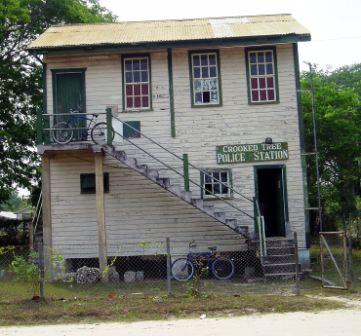Why A U.S. Invasion of Belize Is Not Imminent (Probably)
Our only vital interest there is Francis Coppola
The cool driver – he had dreadlocks – kept the radio on reggae, which dropped like bricks out of the speakers wired along the rusted yellow Blue Bird carrying us north from the birder-supported village of Crooked Tree, Belize. Suddenly the prime minister was on live, assuring the nation that he would not cave in to the “politicians” calling for his resignation and that the teachers better not strike.
“Betta no strike,” is how I suppose they say it in kriol, but the prime minister was speaking school boy English, the legacy of colonial government here in the former British Honduras. The crowd of passengers – a mother with two boys on her lap, men in foreign baseball caps doing complicated handshakes, a woman carefully balancing a mysterious box with air holes punched in the top – all just stared ahead passively. It was sort of like listening to Tom DeLay or the governor of Utah.
Maybe they were thinking about dealing with the officious Mexican customs agents up the road who hate everybody, but I think most of the passengers were wondering how to get rid of the damned prime minister. He is Said Musa, son of immigrants from Palestine or Lebanon (opinions differ) who has gotten rich in office. Everybody who would talk politics with me during my month in Belize said Musa and cronies have diverted so much public revenue that they had to raise taxes, that the national debt is now about $1.7 million per citizen, “And we’re a third world country!”
Musa, one guy told me, “could hide behind a corkscrew.” I don’t know the facts, but it is reported from federal court in Miami that the Belize government took the national telecommunications company from a British lord and contracted to sell it to a Florida investor, who filed a lawsuit for a place denied him on the board. The government has failed to answer the suit despite a $50,000 a day fine imposed by the irate U.S. district judge.
For a couple of weeks in mid April the monopoly phone system was disabled – land lines, cells, even satellite connections. One radio news report said when teckies showed up to undo the apparent sabotage, they were arrested on the grounds that if they knew how to fix it they probably broke it. Phone company employees were staying home. The teachers and various public employee groups were threatening to join the strike. Spot power outages all over the country were generally regarded as demonstrations of sympathy.
For a while Belize was isolated from the world. Hotel keepers said the lack of phone service resulted in reservation no-shows and failures of credit card processing. I know of a case where the British High Commission had to charter a boat to tell a tourist on an island of a death in her family.
Employees were demanding a share of the phone company to protect their jobs. But, as the prime minister was saying on the bus radio, “They don’t have any money.” Well, that seems to be the problem everywhere in this small (pop. less than 300,000) “Caribbean country located in Central America:” No money.
I saw the dangerous poverty in Belize City, the nation’s only urban area, which has a population about equal to Santa Fe. A contact who is a native drove me through some neighborhoods where, he said, “You no wanna be da.” We sat for a while behind the bars of a walkup window where people on the street bought cigarettes one at a time, single beers, rolling papers. It was a parade of desperation. Earlier we stopped for a beer at heavily guarded luxury hotel and casino built by a member of the Saudi royal family.
Less than two weeks later, a riot broke out in the central business district. A demonstration where the prime minister was meeting with strike leaders turned into a march, which became a riot. Businesses were looted, particularly the department store owned by the prime minister’s brother. Police arrested at least 100. (If you need a racial picture here, forget it. Belize looks mostly black, but the people are from a dozen diverse lines, and they really do “get along.”)
Now, Crooked Tree was poverty of a different kind – a more tolerable rural kind where people may be short of cash but have family, community and land. By contrast, near the innocent little southern village of Hopkins we saw sea shore condos going for $500,000 U.S. each – probably more than the total property value of Crooked Tree. We talked to one of the hard drinking condo developers in a bar. He said, “Buy now, sell for $1 million in a couple of years. These all went right away, but we’re building 50 more units.” They scrape every living thing away, plunk down their units, then do some Las Vegas landscaping around the mandatory swimming pool.
And no birds sing. They no wanna be da. I went to Crooked Tree uninformed, looking for water birds in a dry season. In February it’s an Audubon Society paradise, they told me, but in April (after my No. 1 true lady hiking buddy had to fly north) I was the only pale stranger in Crooked Tree. It was like being a Peace Corps volunteer. I went walking on the dirt roads past two-room houses on stilts and got lucky, birder-wise. At a small pond in a pasture I saw about 100 giant egrets and one misfit standing very tall in their midst. A man on a bicycle stopped and said, “Jabiru! Jabiru!” He rode away. It was the jabiru stork, one of the largest birds in the world and rare.

